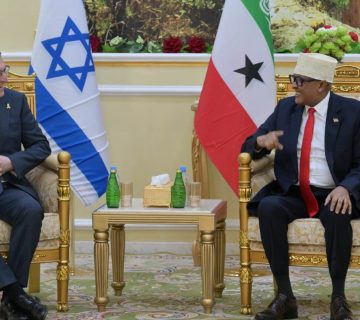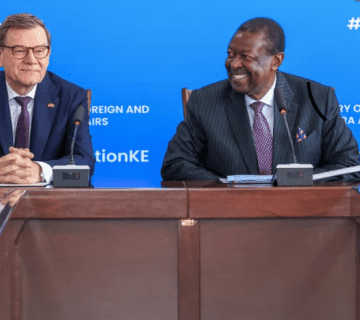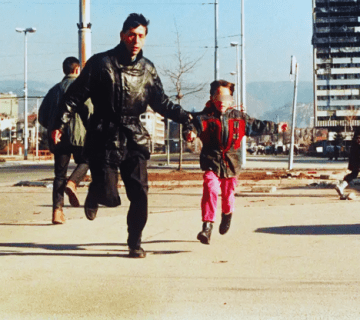The ongoing armed conflict in Ethiopia’s Northern Tigray region threatens to become a protracted crisis that could plague Ethiopia for years. On November 4, 2020, Prime Minister Abiy Ahmed ordered the deployment of Ethiopian National Defence Forces (ENDF) into Tigray for a ‘law and order enforcement’ campaign against the Tigray People’s Liberation Front (TPLF) and allied forces over an attack on the federal army camp located in Mekele, Tigray’s capital. Although the federal government declared the military operation ‘completed’ by November 28, 2020, the fighting persists in various parts of Tigray, seven months later. Preliminary reports have accused major actors – ENDF, TPLF, Eritrean army and Amhara security forces – of orchestrating mass atrocities including rape, deliberate targeting of civilians, as well as massacres and extrajudicial killings of near-genocide proportions, eliciting growing international concern. The Biden administration has taken a bold step to sanction all actors including the Ethiopian government.
The United Nations and European Union have also expressed their deep concerns, with the UN Security Council urging complete investigation and accountability for the war crimes. As international concern increases over the deteriorating situation in Tigray, Abiy’s main challenge lies in speedily halting all active and ongoing fighting in the region and restoring security and safety for Tigrayan civilians. Prolonged fighting in Tigray risks creating an unending cycle of violence in northern Ethiopia with considerable consequences for the stability of Ethiopia and the Horn of Africa. Although TPLF remains belligerent, Abiy must make the difficult decision to withdraw all fighting troops including Eritrean army elements and restore normal security and allow humanitarian access for suffering civilian. Further, the government must make meaningful steps to investigate all reported crimes and administer justice in a manner that corresponds to international law, if at all Abiy and his administration cares for thousands of civilians, victims of the war.
A Near-Genocide War
The fighting in Tigray came on the back of mounting tensions between the federal government and the leadership of TPLF – which had been at the helm of Ethiopia’s politics for over three decades. When Abiy assumed office in 2018, he introduced sweeping reforms, in which he sought to recalibrate political power and address the injustices of the previous regimes including authoritarianism and political repression, ethnicity, corruption, and concerns over access and distribution of national resources. However, the TPLF leadership felt threatened and unfairly targeted by Abiy’s reforms and in February 2020, declined to join the new national Prosperity Party formed to replace the old ruling coalition, the Ethiopia People’s Revolutionary Democratic Front (EPRDF). In September 2020, the tensions worsened, after TPLF held regional elections in total defiance of a federal order that postponed all elections following the outbreak of COVID-19, causing the federal parliament to cut ties with the region.
Although both sides were preparing for a confrontation for weeks before the fighting erupted, the immediate trigger for the conflict was a reported TPLF attack on federal forces’ military installations located in Tigray. What followed was a large deployment of ENDF forces into region, which carried ground and aerial bombardments that far outsized a domestic ‘law-and-order enforcement’ operation. So far, thousands of civilians have been killed and over 1.7 million remain displaced from their homes. The crisis has been marked by a tripartite alliance between the federal forces, Eritrean troops and other paramilitary actors from Amhara waging war against Tigray. While accurate data is still lacking due to heavy government restrictions in the region, some reports indicate widespread human rights violations, massacres and war atrocities that border on genocide.
The massacre in Aksum orchestrated by Eritrean troops between November 28 and 29, 2020, killed an estimated 800 people. Another 1,100 innocent civilian were killed by armed Amhara youths alongside other sporadic attacks deliberately targeting civilian populations throughout Tigray. Reports also indicate sexual harassment and extreme weaponization of rape and hunger against Tigrayans; allegations that have recently been acknowledged by the federal government.
US Sanctions
The crisis in Tigray has sparked a growing international concern. Multiple actors including the G7 have called for the immediate cessation of all hostilities, unhindered humanitarian access and an independent and transparent investigation of all reported war crimes to ensure those responsible are brought to account. In what has been described as drastic turn in the US’ policy towards Ethiopia, the Biden administration applied tougher measures including sanctions. On May 24, 2021, the US Secretary of State, Antony Blinken, announced the withdrawal of economic and security support to Ethiopia except for humanitarian aid as well as visa restrictions targeting all actors in the Tigray conflict. In his statement, Blinken expressed the increasing US’ frustration with what it termed as failure by the parties to take “meaningful steps to end hostilities or pursue a peaceful resolution of the political crisis”.
The withdrawal of US’s support has wide-ranging implications for Abiy’s administration and Ethiopia at large. First, the reported atrocities have damaged Ethiopia’s international reputation and could cause further isolation, as other Western donors might follow the US’ example to put pressure of the federal government, should the crackdown in Tigray continue unabated. Second, the sanctions have come at a time when Ethiopia is looking to hold its federal elections in which Abiy faces increasing opposition including from factions within the new Prosperity Party. Having been postponed twice, first due to COVID-19 and then over logistical challenges, the elections are now scheduled for June 21, but are likely to be marred by logistical challenges and possible irregularities.
Bottom Line
There is no doubt that the events in Tigray have cast a shadow over Abiy’s capacity to achieve his goal of democratic liberalization and pan-Ethiopian dream. Now as elections approach Abiy must work to end the hostilities in Tigray and promote national cohesion and unity in Ethiopia. He must order the withdrawal of all fighting troops in Tigray and ensure protection of innocent Tigray civilians as well as a restoration security along the Eritrean-Tigray border to prevent further attack by Eritrean forces. Ending the hostilities will not only help pull Ethiopia back from the brink but also lend legitimacy to Abiy should he become victorious in the upcoming elections.
Otieno O. Joel is a Researcher at the HORN Institute
Photo: A section of Amhara protesters carry Ethiopian national flags to stand in honor of the Ethiopian army in the Tigray conflict on November 17, 2020 in Addis Ababa, Ethiopia (Photo Credit: AFP Photo)
The contents of this article are copyright of © The HORN Institute 2022. All rights reserved. Any redistribution or reproduction of part or all of the contents in any form and for whatever reason is prohibited. You may use the content of this article for personal reasons, but acknowledge the website as the source of the material.



